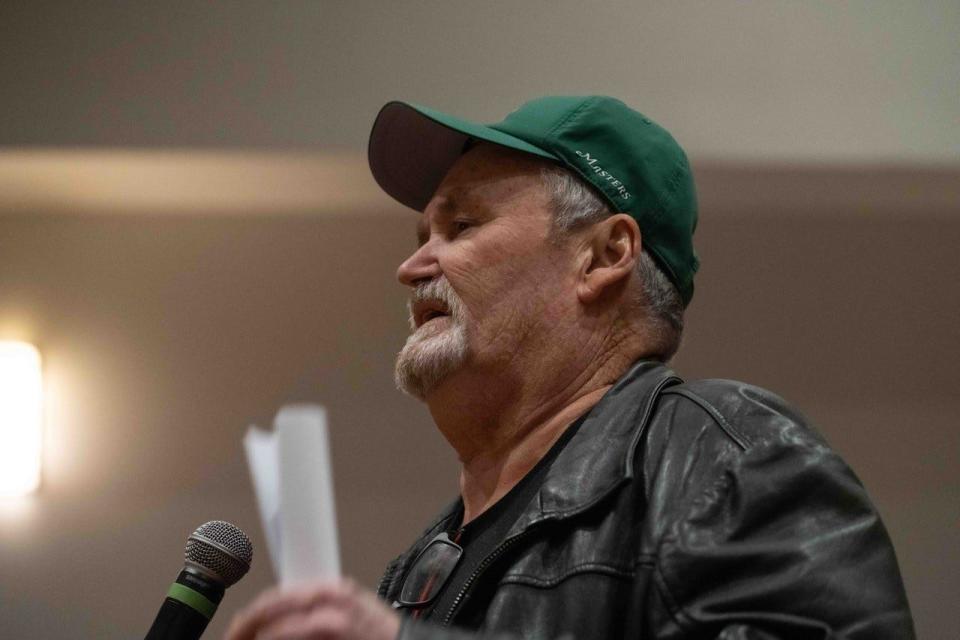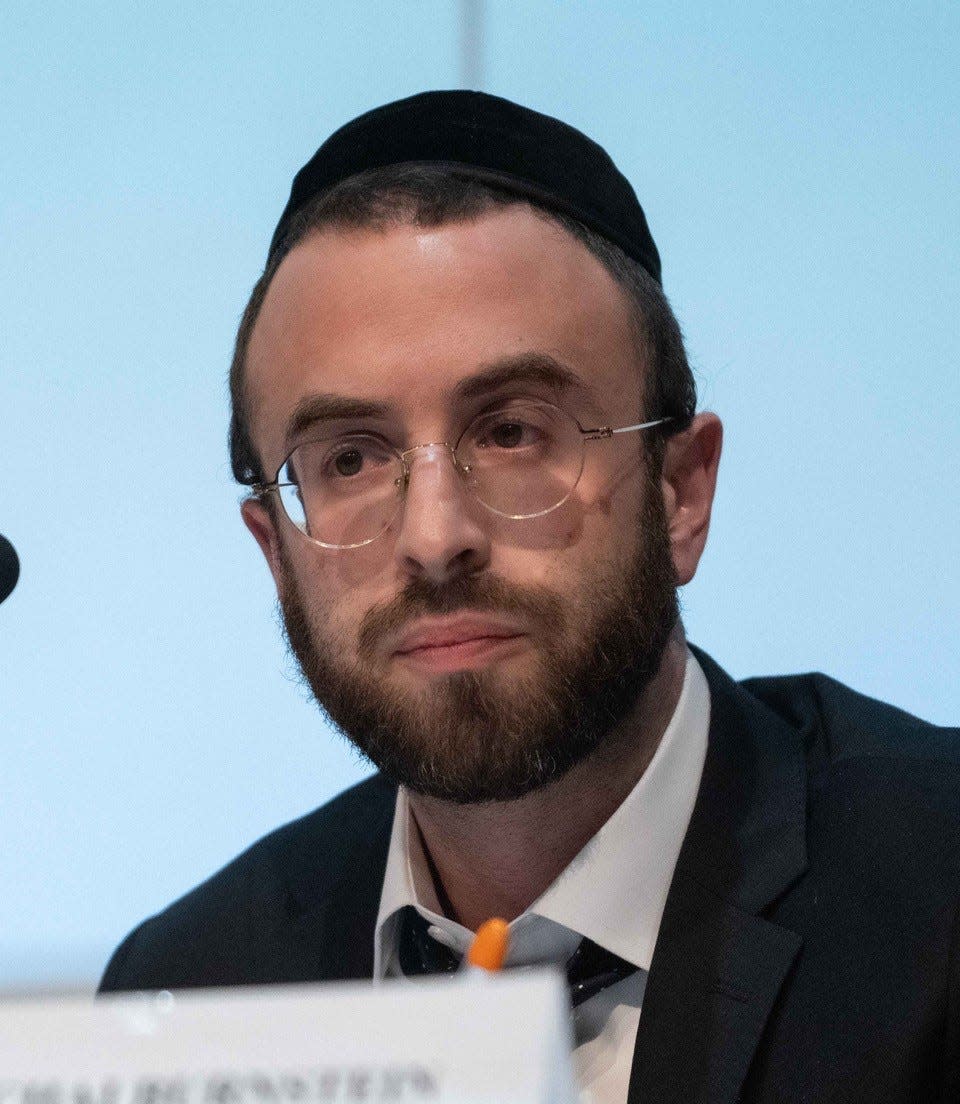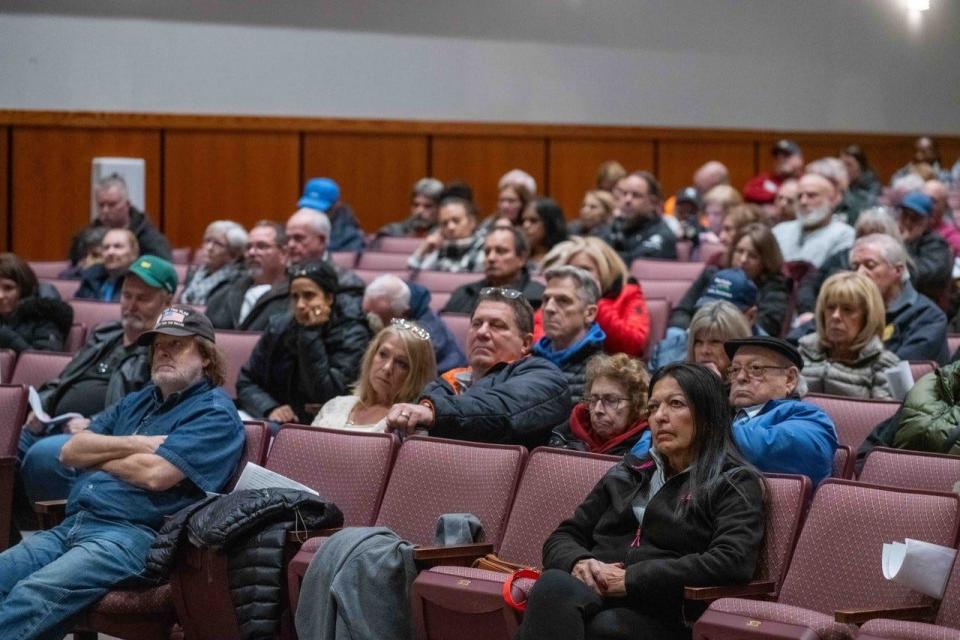Jackson was sued for antisemitism. At settlement meeting, residents blame Orthodox Jews
JACKSON - More than six years ago, a standing-room-only crowd erupted into applause when the Jackson Township Council approved ordinances banning the construction of new schools and dormitories.
The crowd on Tuesday night was even bigger — so big that the meeting was moved to the high school auditorium. But this time, there was little applause as those 2017 ordinances were replaced by new regulations reclassifying schools, dormitories and other religious developments as permitted uses.
There were groans. And booing. Residents shouted down any suggestion that it was their own antisemitic rhetoric — in public meetings or online — that led to these new ordinances, the settlements that required them and the lawsuits that preceded them.
Even as they painted the town's booming Orthodox Jewish community — the only people looking to build schools or dormitories — as guilty of "getting everything they want." Of a "hostile takeover."
Even a "cultural genocide."
The Jackson Township Council on Tuesday adopted ordinances regulating schools, dormitories, houses of worship, eruvim and religious bathing facilities within the municipality's zoning code, a key component of the township's three major settlement agreements with federal and state law enforcement officials, as well as Orthodox Jewish advocacy group Agudath Israel and hopeful Orthodox Jewish private school developer. The changes were codified in two ordinances, one of which specifically changes zoning for Pinelands areas of the township. That ordinance will require further approval by the New Jersey Pinelands Commission.
Neither ordinance contains blanket approvals for the new religious uses. A developer looking to build a religious school in a newly-appropriate zone would still have to go before the planning board, for example.
"It is crucial we work together to address the concerns of all residents, while at the same time upholding the principles of religious freedom allowing us all to live in harmony in this beautiful and growing community," Agudath Israel associate director Shlomo Schorr said, to groans from the audience when he said he lived in Lakewood. "The settlement of this lawsuit signifies not only a legal agreement but also a statement to the power of dialogue and mutual respect between all parties. We believe that, through continued collaboration, we can build bridges of understanding that strengthen the fabric of this community."
The latest: Jackson agrees to huge payout to settle antisemitism lawsuit
In addition to the ordinances, the township is on the hook for nearly $5 million in restitution, damages and penalties in the three lawsuits.
"No settlement is ever perfect. Generally, the parties are somewhat dissatisfied with the outcome," said Brent Pohlman, an attorney representing Jackson in religious land use cases. "Given the underlying facts, the township was in a position where it could have had the court dictate the zoning for schools and dorms and had no input.
"The township negotiated a settlement that is constitutionally compliant and establishes a zoning plan that attempts to head off and address the potential adverse impact related to the development of schools."
Both settlement ordinances passed with Councilman Mordechai Burnstein, Councilwoman Jennifer Kuhn and Councilman Scott Sargent voting in favor.
Council Vice President Nino Borrelli voted against both ordinances, citing overdevelopment concerns. Council President Stephen Chisholm, Jr., abstained from voting on one ordinance and voted against the Pinelands ordinance, quoting the Tenth Amendment, which reserves the right of states and their people to refuse to enforce federal laws not specifically mentioned in the U.S. Constitution.
Chisholm, along with Mayor Michael Reina and township zoning officer Jeff Purpuro, signed the Agudath Israel settlement last week, which included a near-identical copy of the ordinances passed on Tuesday.
An airing of grievances
In each of those lawsuits, plaintiffs argued that township officials caved to what the Department of Justice described as a “antisemitic animus" across the town when it passed ordinances and resolutions — as well as making statements and pushing code enforcement officers to spy on Sabbath services — targeting the town's growing Orthodox Jewish community and dissuading other Orthodox families from moving to the town.
In its 2019 amended complaint, Orthodox Jewish advocacy group Agudath Israel included pages of blatantly antisemitic social media comments (including those made on Asbury Park Press articles) and quotes from residents spouting similar tropes.

Pohlman, repeating a claim made at a special meeting last week, partially blamed those comments for the town's precarious legal position. Because such comments were made publicly and, often, on the record, plaintiffs argued that the township council's decision to ban dormitories, schools and eruvim were influenced by them, Pohlman said.
(Pohlman excluded Mayor Michael Reina from that criticism. Reina, the town's mayor since 2008, is the only elected official in Jackson who was in office at the time. He signed each ordinance into law.)
While Jackson council meetings have regularly devolved into screaming matches using coded language to refer to the Orthodox Jewish community, rarely has the rhetoric been as overt as it was on Tuesday.
"Isn't it a fact that, if we didn't have a large Hasidic community, this wouldn't be taking place," South Baker Drive resident Bruce Lykes said. "We are witnesses to the hostile takeover of Jackson Township, just as we were witness to the hostile takeover of Lakewood Township. And it has got to stop."
He received raucous applause and cheering.
Quail Road resident Patrick Panella cited his service in the U.S. Marines and volunteer work in the rubble of the 9/11 attacks on the World Trade Center as proof that he wasn't biased toward any person based on their race, ethnicity or religion.
And then he pointed at Councilman Mordechai Burnstein, an Orthodox Jewish community and political leader: "Mr. Burnstein, with all due respect, you have one agenda here and it's not for the people of Jackson. It's for your people of Jackson."
The crowd erupted.
Related: 'Discriminatory and derogatory' public commentary led to Jackson lawsuits, attorney says.
Not every public comment took full aim at the Orthodox community. Residents expressed genuine concerns with the ordinances allowing for potential large-scale development in small neighborhoods and traffic impacts that come with school campuses. Numerous residents pointed out potential conflicts by Burnstein, a former Agudath Israel member who submitted screenshots of antisemitic Facebook posts as part of the group's lawsuit.
But more often than not, residents used the meeting as a five-hour airing of nearly a decade of grievances — blaming Reina for his own comments cited in the lawsuits, rehashing the debate over a school project currently before the planning board and even denying that the Department of Justice, with whom the township settled last year, ever cited residents' antisemitic statements in the first place.
The Justice Department's 2020 complaint specifically stated that "residents of Jackson, as well as other townships neighboring Lakewood, have expressed hostile views toward the Orthodox community and have expressed concerns that the Orthodox community will continue to increase and change the township’s culture."
"Saying 'we don't want you in town' — can you imagine if we said we don't want LGBTQ or Hispanic people in the town," Burnstein said in an interview. "Being antisemitic doesn't mean you're saying 'heil Hitler.' There's a lot of ways, and saying you don't someone in the town based solely on their religion, or can't be on a board because of their religion, is pretty prejudiced to me."
He expected antisemitic comments at the council meeting, but expected them to be much worse.
"Some of those comments were vile and hurtful," he said. "But I guess I'm used to it."

A decade in the making
The new ordinances represent a dramatic, 10-year turnaround.
Jackson’s Orthodox Jewish community began growing nearly a decade ago, with many Lakewood-based families moving to the larger lots, quieter neighborhoods and less-trafficked roads of Jackson. Lakewood has long been one of the world's largest Orthodox enclaves, about two-thirds of the town's 140,000 people — but it's bursting at the seams, with nearly 33,000 housing units and more than 5,600 people per square mile, according to Census statistics.
Jackson has less than 22,000 housing units and less than 600 people per square mile.
For years, Jackson residents and officials have pointed to their easterly neighbors as a cautionary tale, citing the traffic, continuing development and, often, the public school district, which took out more than $200 million in state loans to pay its bills. The shortfall is often attributed to complying with a state law that require public school districts to provide busing for all students, including private school students.
In Lakewood, there are more private school students than public school students — and, in Jackson, the private school population has more than doubled in recent years. Last month, Jackson voters shot down a $4 million referendum that would have funded hiring nearly three dozen teachers and staffers.
"I've watched the changes in Jackson and change is part of what goes on. But with this ordinance, we're opening the door for future exploitation of the resources of the town of Jackson," said West Virginia Avenue resident Thomas Bradley, a teacher at Jackson Liberty High School. "You're opening the door for the cultural genocide that has taken place in Lakewood to come here to Jackson. We have to take a serious look at what these ordinances would do to the town."
In the late 2010s, the Orthodox Jewish community was at the center of nearly every hot-button issue facing Jackson, from the denial of an Orthodox Jewish girls' high school — which also required a high school auditorium to handle overflow crowds — to a "no-knock" ordinance and to questions about the Lakewood Civilian Safety Watch, a volunteer neighborhood watch group.
But the bans on schools and dormitories changed everything. In those cases, that discrimination was clear, plaintiffs said: The only schools developers were looking to build were for Orthodox Jewish children. Some high schools require boys to board as a way of shielding them from secular distractions. And the eruv ordinance only came after a group of residents came to the township with a proposal for building one.
"These ordinances cannot be understood to accomplish anything other than to target the Orthodox Jewish community and were adopted for that very purpose," attorneys Donna Jennings and Sieglinde Rath wrote in a 2019 legal filing.
More: Will Jackson be sued over Orthodox Jewish eruv ban?
All of those issues would wind up in the pages of lawsuits filed by the Justice Department and the New Jersey Attorney General's Office. Similar points were also raised in lawsuits by the developer of the Jackson Trails housing development and Oros Bais Yaakov, the proposed Orthodox Jewish girls' high school which sued after a zoning board rejection in 2014.

That case wasn't settled until earlier this year, when the school was finally approved.
"We didn't have to waste millions of dollars and all the resources of our town," said Willow Point Drive resident Donny Adelman, one of just two Jackson residents to speak out in favor of the new ordinances.
"Many of you claim that you're not antisemitic, and that may be true in your heart," he continued. "But you're focusing on a particular religious group that has a certain set of laws and cultures. You don't have to like it. Nobody's asking you to enjoy it. But they do have the right to be a part of the community."
The crowd, starting to dwindle three-and-a-half hours into a five-hour hearing, began to boo. They didn't let up until Adelman stepped away from the microphone.
Mike Davis has spent the last decade covering New Jersey local news, marijuana legalization, transportation and a little bit of everything else. He's won a few awards that make his parents very proud. Contact him at mdavis@gannettnj.com or @byMikeDavis on Twitter.
This article originally appeared on Asbury Park Press: Jackson approves ordinances settling antisemitism suits. Crowd boos

